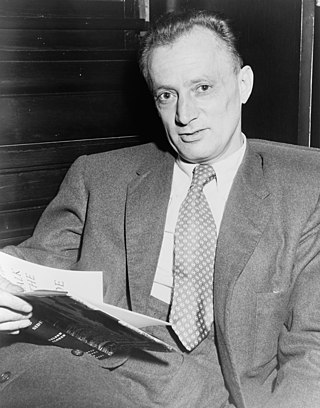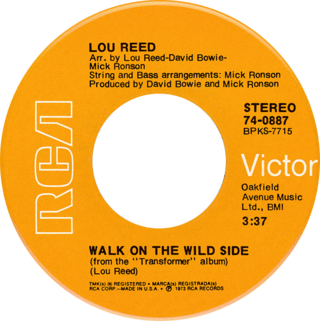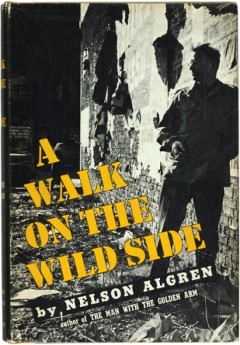See also
- Take a Walk on the Wildside , a 2017 Canadian documentary
Walk on the Wild Side may refer to:
An animal is a multicellular, eukaryotic organism of the kingdom Animalia or Metazoa.

Lewis Allan Reed was an American musician and songwriter. He was the guitarist, singer, and principal songwriter for the rock band The Velvet Underground and had a solo career that spanned five decades. Although not commercially successful during its existence, the Velvet Underground became regarded as one of the most influential bands in the history of underground and alternative rock music. Reed's distinctive deadpan voice, poetic and transgressive lyrics, and experimental guitar playing were trademarks throughout his long career.

The Man with the Golden Arm is a 1955 American drama film with elements of film noir directed by Otto Preminger, based on the novel of the same name by Nelson Algren. Starring Frank Sinatra, Eleanor Parker, Kim Novak, Arnold Stang and Darren McGavin, it recounts the story of a drug addict who gets clean while in prison, but struggles to stay that way in the outside world. Although the addictive drug is never identified in the film, according to the American Film Institute "most contemporary and modern sources assume that it is heroin", although in Algren's book it is morphine. The film's initial release was controversial for its treatment of the then-taboo subject of drug addiction.

Nelson Algren was an American writer. His 1949 novel The Man with the Golden Arm won the National Book Award and was adapted as the 1955 film of the same name.
New York most commonly refers to:

Transformer is the second solo studio album by American recording artist Lou Reed. Produced by David Bowie and Mick Ronson, the album was released in November 1972 by RCA Records. It is considered an influential landmark of the glam rock genre, anchored by Reed's most successful single, "Walk on the Wild Side", which touched on controversial topics of sexual orientation, gender identity, prostitution and drug use. Although Reed's self-titled debut solo album had been unsuccessful, Bowie had been an early fan of Reed's former band The Velvet Underground and used his fame to promote Reed, who had not yet achieved mainstream success.
"Home of the Brave" is the ending phrase from the United States national anthem "The Star-Spangled Banner". It may refer to:
Wild, wild, wilds or wild may refer to:

"Walk on the Wild Side" is a song by American rock musician Lou Reed from his second solo studio album, Transformer (1972). It was produced by David Bowie and Mick Ronson and released as a double A-side with "Perfect Day". Known as a counterculture anthem, the song received wide radio coverage and became Reed's biggest hit and signature song while touching on topics considered taboo at the time, such as transgender people, drugs, male prostitution, and oral sex.
Wild child usually refers to a feral child; it may also refer to:

A Walk on the Wild Side is a 1956 novel by Nelson Algren, also adapted into the 1962 film of the same name. Set in Depression era, it is "the tragi-comedy of Dove Linkhorn", a naive Texan drifting from his hometown to New Orleans.

"Can I Kick It?" is a song by American hip hop group A Tribe Called Quest, released in October 1990 as the third single from their debut album, People's Instinctive Travels and the Paths of Rhythm (1990). The song, which has a call and response chorus, was recorded in 1989, when the band members were aged 18-19.
Wildside or Wild Side may refer to:
The Call of the Wild is a 1903 novel by Jack London.
"The Wild Side of Life" is a song made famous by country music singer Hank Thompson. Originally released in 1952, the song became one of the most popular recordings in the genre's history, spending 15 weeks at number one on the Billboard country chart, solidified Thompson's status as a country music superstar and inspired the answer song, "It Wasn't God Who Made Honky Tonk Angels" by Kitty Wells.

Walk on the Wild Side is a 1962 American drama film directed by Edward Dmytryk, and starring Laurence Harvey, Capucine, Jane Fonda, Anne Baxter and Barbara Stanwyck. It was adapted from the 1956 novel A Walk on the Wild Side by American author Nelson Algren. The film was scripted by John Fante.
Women are adult female humans.

Somebody in Boots is writer Nelson Algren's first novel, based on his personal experiences of living in Texas during the Great Depression. The novel was published by Vanguard Press in 1935. The title refers to someone with material well-being and authority, as poor folk and the powerless wore shoes or went barefoot. The bosses and police feared by the poor and downtrodden wear boots, which not only symbolize their power and relative affluence, but can be used as weapons against them.
Maker or the Maker(s) may refer to:
Joe Campbell was an American actor who appeared in the 1965 film My Hustler. In the film Campbell's role was called "Sugar Plum Fairy". Campbell was mentioned as "the Sugar Plum Fairy" in the 1972 Lou Reed song "Walk on the Wild Side". Campbell was given that nickname by Dorothy Dean. Campbell was in a relationship with Harvey Milk from 1955 to 1962. He died on October 2, 2005. He was 68 years old.